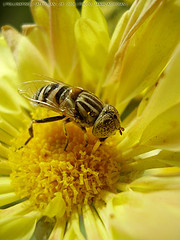- 3 reads

There are a lot of chemicals on the American market.
And seemingly more are introduced every day to help make our lives simpler, houses cleaner, and lawns greener. We use them, assuming that they have gone through an appropriate process to ensure that these chemicals cannot harm us or the environment. Sadly, that process seems to have failed recently with some pesticides called Movento and Ultor. No, you aren’t in any danger…
…but your food might be…
Movento and Ultor are trade names for a new pesticide called spirotetramat. In June 2008, EPA approved Movento for nationwide use on hundreds of different crops, including apples, pears, peaches, oranges, tomatoes, grapes, strawberries, almonds, and spinach. This, despite very significant concerns from scientists and beekeepers about the product’s toxicity to honey bees. And sadly, those concerned folks did not get a chance to voice those concerns because the pesticide’s approval process went forward without the advance notice and opportunity for public comment that is required by federal law and EPA’s own regulations. In addition, NRDC’s legal experts feel that the EPA failed to fully evaluate the potential damage to the nation’s already beleaguered bee populations or conduct the required analysis of the pesticide’s economic, environmental, and social costs.
But, hey, it’s the New Year, so I am staying positive. And there is good news about this particular chemical. NRDC and Xerces Society challenged the illegal registration of spirotetramat and won in December. A federal court in New York invalidated EPA’s approval of the pesticide and ordered the agency to reevaluate the chemical in compliance with the law. The court found that EPA "utterly failed" to comply with the law and gave "no explanation whatsoever for these shortcomings." The court’s order goes into effect on January 15, 2010, and makes future sales of Movento illegal in the United States.
In bringing this lawsuit, NRDC sought not only to protect bees but also to force reform in EPA’s evaluation practices for pesticides and other chemicals. Bees are hardly the only thing that the current process systematically fails to evaluate, such as the environmental effect of pesticide mixtures. In the real world, pesticides aren’t used alone but in combination with other pesticides, fungicides, herbicides, etc. The synergistic effects can be highly toxic even where a single pesticide is deemed safe.
The court’s decision forces Movento to be pulled from store shelves. Some might think this is a dramatic move, but the stakes are high. According to the U.S. Department of Agriculture (USDA), bees pollinate $15 billion worth of crops grown in America. USDA also claims that one out of every three mouthfuls of food in the typical American diet has a connection to bee pollination. Yet bee colonies in the United States have seen significant declines in recent years due to a combination of stressors, almost certainly including insecticide exposure.
So EPA and Bayer CropScience (the pesticide’s maker) will need to start the chemical registration process over. And when they do, you can be sure that they will hear NRDC, beekeepers, and scientists expressing concern over Movento’s potential impact on beneficial insects such as honey bees. It won’t be a surprise, since EPA’s review of Bayer’s scientific studies found that trace residues of Movento brought back to the hive by adult bees could cause “significant mortality” and “massive perturbation” to young honeybees (larvae). Let’s hope that this issue gets more play with the regulators when the process moves forward…
…and more importantly, let’s hope this is a reminder to EPA of the importance of the process. We can’t mess with American bees without messing with the American food supply.
* * * This post originally appeared on NRDC's Switchboard.
Josh Mogerman is Senior Media Associate in The Natural Resources Defense Council’s Chicago office where he uses his wildlife conservation background to manage communications for NRDC’s work in the Midwest. NRDC is a non-profit organization dedicated to protecting the environment, people and animals. NRDC was founded in 1970 and is comprised of more than 300 lawyers, scientists and policy experts, with more than one million members and e-activists.

